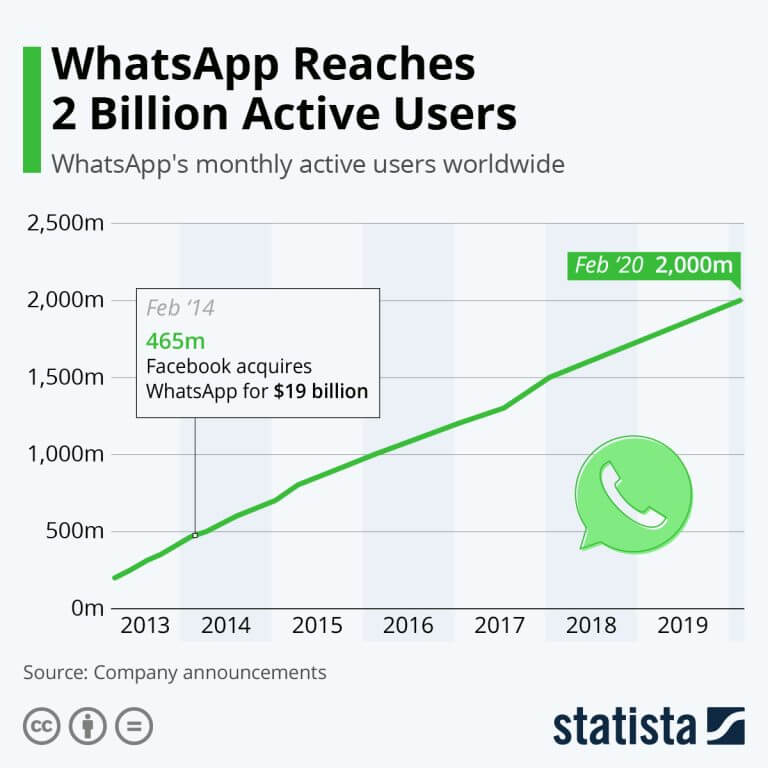
The function and layout is so easy to use but completes with all essential features like text messaging, voice messaging, sharing photos, videos, GIFs, and even location. What’s more? It is Free! And easily accessible. You can avoid any work related emails by switching off your laptop, but extremely difficult to avoid WhatsApp messages from workplace as 90% of the people will still hang on to their smartphones even after working hour.
WhatsApp has changed the way how people connect, and many businesses use WhatsApp as one of their primary communication channel over email and phones calls because it is easy to set up, plenty of integrations, great compatibility and widely use. Moreover, data cost is no longer a concern as making calls via WhatsApp basically cost nothing, compare to phone calls.
Should WhatsApp going to replace Email?
Well, the answer is definitely NO.
Yes, your boss might send you a task over WhatsApp instead of email, and you may communicate with your coworkers or clients on WhatsApp to discuss a project, but business emails are still irreplaceable as a business communication tool.
- Archival/Retrieval/Search Issue: WhatsApp messages can be fast, but it did not change the fact that it is an “Instant Messaging” application, anyway. So, it could be a problem when it comes to track or record past communication. But with Email, you could categorize your conversation into different folders, sort it according to date, subject or sender detail.
- Multiple Threads Difficult to Track: When you are discussing different topics with the same party all at the same time, how are you going to refer your next reply to tie back to a specific topic? It is easy to confuse the recipient and easily to lose track of all the communication chain. There is no proven record of how long the messages in WhatsApp will last too.
- CC and BCC: CC and BCC are important in business email, as it differentiate out the stakeholders from the intended recipient. However, IMs such as WhatsApp do not offer this feature.
- Email Offers More Security: Email system has already developed a whole security ecosystem to make it more secure and robust. For example, anti-spam, malware protection, anti-ransomware, URL checker, S/MIME, and etc. On the other hand, IM such as WhatsApp does not and will not filter out any spam messages, it does not come with an anti-virus that checks the attachment. Anyone with your phone number can basically send you anything directly.
- Loss of Picture Quality: WhatsApp’s image compression algorithm will reduce the image quality you send through the IM. This is to reduce the capacity it is using, which is good news to its user as it saves their Internet data bill. While it does not make a big difference when view through the mobile device, however if you are attempting to use that image in your work, the inferior image quality will be less than satisfaction.
- Keep Business and Personal Apart: The product design and nature of WhatsApp and other IMs are meant to be personal and casual, you could have an informal discussion with colleagues or clients on WhatsApp, but should always follow up by an official email and stated the summary of the conversation.
- Proprietary: WhatsApp and other IMs are a proprietor application. In order for you to communicate with others, the other party must have the same application installed on their end. Else, your communication will fail. For example, in Japan, most people are on LINE while 62% of the Australian is on Facebook messenger. Unlike Email, the protocol is always a standard.
Regardless of how flexible and convenient provided by WhatsApp or any other IM, but email is here to stay.
Cloud enabled email to be more efficient and lower cost. So much that some email service providers giving out free enterprise grade email to business too, such as Zoho with upgradable add-ons. Unlike any free email like Gmail and Hotmail, its enterprise grade email platform eliminates unwanted ads and enhanced its security, such as data encryption and anti-malware.
Both email and IM have its own strengths and weakness, business should never rely on single business communications. We should remember that IM is meant for quick, informal and short-term communications. But it is always a good idea to recap important conversations over email for record keeping.

